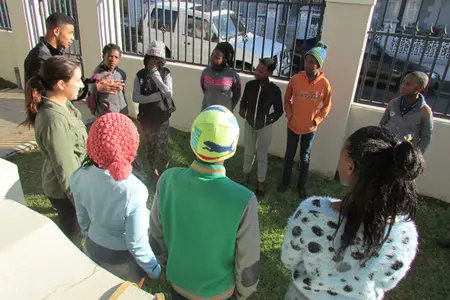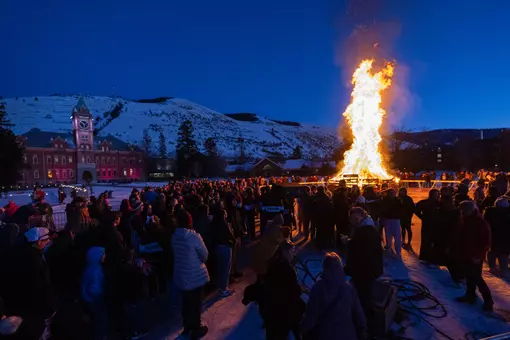
2015 GoGriz.com Person of the Year
12/25/2015 7:34:00 AM | General, Women's Track and Field
The immutable law of the pole vault is this: the bar always wins. No matter what. Clear a career-best height, and while you celebrate a small victory, the bar gets raised higher. A new challenge always awaits.
It's an event based on ultimate defeat. Before you're done, you'll knock the bar off three times at a height and walk away beaten, no matter the incremental victories made along the way.
So why strive at all?

Emily Mendoza, a senior on the Montana track and field team, has been chosen as the first GoGriz.com Person of the Year, and not because she spent her summer in South Africa completing a senior practicum for her social work degree.
She wasn't chosen because she devoted 480 hours of service to the areas of children's rights, human trafficking, prostitution and sexual exploitation. She wasn't chosen because the experience changed her life or because it helped her realize her true calling.
Instead she is the Person of the Year because after learning years ago about some of the world's most heinous problems, she hasn't been able to get them out of her mind. And she won't stop until she's made a difference, somehow, somewhere.
"I don't know why I grab hold of issues like human trafficking and sexual exploitation so tightly," she says. "I don't know why it bothers me so much, but it's something I can't ignore.
"Sometimes I wish I could be one of those people who can sweep those issues under the rug. It's not my world. I don't have to see it. But I get overwhelmed thinking about all the things that go on in the world."

Of course it wasn't always that way. Worldviews are learned, not inherent. It was the same for Mendoza as it was for the traffickers she hopes to one day stop. The latter came about their views through environment, the former through education.
Mendoza's enlightenment came from a pair of books read while growing up in Poway, Calif. A Thousand Splendid Suns and Sold. Had she expressed herself on social media at the time and in the language of her generation, she might have keyboarded #afghanistan#wtf#coming4u.
"She was highly affected by what she read. I think those books were sort of a catalyst," says Mendoza's mom, Diane, who does Title 24 energy calculations for new homes.
It was an interest, if not yet a passion, and it was put on the backburner when it came time for college and a career choice. She arrived at Montana intending to pursue a degree in health and human performance. The plan didn't last.
"In contrast to some of the California schools, Montana seems to have a great ability to expose kids early in their education to career opportunities and have them look forward to where they're headed," says Mendoza's dad, Robert, an engineer.
"She went through that process with HHP and realized it wasn't what she wanted to do. The career services that UM has to offer played a big role in helping her understand what was inside of her all along."
Through UM's Internship Services, Mendoza was connected with IE3 Global, which landed her a spot at an organization in South Africa that would allow her to fulfill her practicum.

She'd read books, watched documentaries, written papers and put together presentations for her classes at Montana on the subjects of trafficking and sexual exploitation, but nothing prepared her for what she would experience upon landing in Cape Town.
"The first thing I learned was my ignorance," she wrote last summer after arriving for her three-month internship with Molo Songololo, an organization created in 1979 to promote the rights and protection of the children of South Africa at the national, provincial and community level.
The basic idea of the internship -- help fight all the wrongs she knew were out there -- was exactly what Mendoza was looking for. What she wasn't prepared for were all the things that fuel the machine, the one she was in South Africa to crush, and keep it humming along.
The machine had everything it needed in the destitute townships, the lasting remnants of Apartheid, that dotted the landscape around metropolitan Cape Town. Disease (with widespread HIV), drugs, poverty, unemployment, violence, single- and no-parent homes, underachieving schools.
"The poverty was like nothing I'd seen before," Mendoza wrote. "The number and severity of issues that coincide with child trafficking overwhelmed me."
She wanted to make a difference, but what part of the machine do you try to disable first, or at least slow down? How does a small organization like Molo Songololo attack poverty? Unemployment? Drugs? Broken homes? And if one variable is eliminated, would it even matter? Is it a war that's even winnable?
In that environment, young girls are drawn to the machine, because what other option is there? And once they are caught, there is no way out and little chance of escape. The result might be prostitution, it might be getting trafficked to another country for work. None of it good.
Predators are ever present, ready to earn the girls' trust, first with friendship and some flattery, then with gifts, later with promises of a better life somewhere else in a magical faraway place. The hook is set, and the machine rages on.
And if a nation can't fix the problem, what chance did a three-month intern in a strange land have?
Overwhelmed, often to tears, Mendoza was not daunted. "Driving through the townships was unlike anything I have ever done before," she wrote about her first days in the country. "I am looking forward to interacting with the locals even more."

Mendoza lived in a house with eight other international students in Observatory (Obs to the locals), the same Cape Town suburb in which the Molo Songololo offices were located. Most of her hands-on work was done in the township of Delft.
"I went into (the internship) trying to have no real expectations of what it would be," she says. "Would I be making coffee, or would I have some real responsibility?
"At first I wasn't really doing a lot, just sitting at a desk. Eventually I gained the trust of the people at the organization, and it ended up being a great fit. I got everything out of it that I wanted and more. I ended up with opportunities that a lot of interns might not have had."
The bulk of Mendoza's time was devoted to workshops, both preparing for and helping put them on. They were gatherings with kids ages 10 to 17, workshops based on education, not lectures. They weren't designed to stop the machine so much as to keep as many girls as possible out of its jaws.
"We would talk to them about their rights as children and how to protect themselves from trafficking and prostitution. A lot of times the girls are doing it because they have no other means to make money," says Mendoza, who was always aware of the issue of the White Savior and how she might be viewed.
Because how many white faces had those kids already seen? How many people had passed through their lives telling them that it doesn't have to be like this, that there is a better way? In the end, just words, right before the kids returned to a home with no running water, no electricity, no food.
"That was one of my biggest challenges," Mendoza says. "These horrible things are going on, and I'm this outsider coming into their country for three months. Who am I to say, 'Don't do that to yourself'?
"So it wasn't really direct. We wouldn't say, 'Shame on you, don't do that anymore.' It was more like, 'Glad you came to the workshop today.' Then we would talk about sexual health and prostitution."
And in the background, always, the machine hummed along.

Which paints a bleak picture of the kids and a number of the adults and parents Mendoza came across, which she wouldn't want. As she was learning, environments, no matter how dire, do not have the final say. The human spirit, calibrated correctly, can overcome just about any injustice, any situation.
Did we mention Mendoza spent a day visiting Robben Island, where Nelson Mandela was imprisoned for part of his 27 years behind bars?
"There were so many kids who were just amazingly enthusiastic about showing up for our workshops and going to school and being active in their communities," she says. "They were what kept me going the whole time."
The entire experience, so many feelings. Of helplessness that she could only do so much. Of love for the kids who had seen so much evil but had still retained a joy for life. Of understanding that the machine would continue to roll along, devouring many, maybe girls she'd met, long after she left.
It's why her return home was such a difficult experience. What she left behind. What she came home to. So many questions. Of priorities. Was she doing enough? Why weren't more people concerned? Why did they go about their lives like the world wasn't full of problems? Couldn't they see what she sees?
"I warned her that she would experience some mixed emotions," says Robert, who has traveled extensively internationally, "because I've gone through that myself after being in other countries.
"At the time of her return (to the U.S.), we were staying down in the Redondo Beach area, where it can be exclusive. There is a lot of affluence and exuberance." "And lack of gratitude," adds Diane. "It was a culture shock for her."
The reunited family went out for dinner, then for ice cream. A chance to celebrate the opportunity to be back together, that their daughter had arrived home safely. But the triggers, and who knows what they might be, were always close by.
"The people standing behind us in the line for ice cream were complaining about how long the line was, and I could not handle it," says Emily. "I was out in public and finally felt safe, and it was the best thing in the world to me. And these people wouldn't stop complaining.
"By the time I got to the front of the line, I was in tears."
"Part of the growth that she experienced in South Africa and then in her return was that people are people, no matter where you are," says Robert. "It doesn't matter how rich or poor they are. There are good and bad people everywhere, and that really resonated with her."

In addition to the workshops, Mendoza helped Molo Songololo work on legislation. There was the victim-empowerment bill that proposed social workers be present when girls and women undergo rape examinations.
"It's traumatizing, especially if there is no one there to support the child and help them through the process of recovery. Someone needs to make sure they don't get lost in the system," Mendoza says.
The other major piece they had input on was the Children's Amendment Act, which tried to create a separate registry for child and adult sex offenders.
"The idea behind that was children commit sexual crimes for different reasons than adults do," she says. "A lot of times children act that way because they've seen a family member do it or they've been victims of sexual abuse themselves.
"It would give them an opportunity to repeal whatever punishment they had when they become 18. It would make it so their lives aren't ruined for something they didn't really understand they were doing."

It was later in the summer that the intern had her big breakthrough. A workshop idea she presented to her supervisor, about grooming, was met with the answer, Run with it. Prepare it, organize it, deliver it at one of the local high schools.
"Traffickers start by trying to build relationships. The workshop we did talked about what that looks like," says Mendoza.
"You might think it's a friendly neighbor or relative, but there are signs. You might believe they are genuinely nice people, but oftentimes they aren't. That's how the whole process can start."
A workshop is completed, but how do you measure its success? What is the return on investment? One girl making one good decision? Does that make it all worthwhile if there were 25 in attendance?
It's a daunting prospect, and not for the uncommitted or easily frustrated. Because if you keep one girl out of the maw of the machine, aren't there hundreds more you haven't been able to reach and never will? Who will stand up for them? Can the machine ever be stopped?
"I don't feel like I went over there and changed the world," Mendoza says. "I was able to learn and grow, and I think I was able to have an impact on some of the kids who I worked with. I got a lot of praise from family members, but it didn't feel like that to me."
But maybe outsiders have been going about attacking the machine the wrong way. Instead of battling it head-on, maybe it needs to be taken down from the ground up.
And maybe that will be Mendoza's legacy, at least for now. Because before she left she drafted a proposal for a peer-educator program. It's what she's most proud of from her time in South Africa. It's being employed right now by Molo Songololo as Mendoza nears her final semester at Montana.
"I think she learned partway through that people come and go who want to make an impact," says Robert. "She realized that maybe she could leave something behind that they can carry on.
"Real change has to come from within, from people who are native to the area. The best thing you can do is plant a seed and have it grow. Maybe that's what the peer-educator program she put together can be."
Mendoza learned plenty during her three-month internship. Maybe more than the classes in her formal education combined. And it has her head swimming as she starts preparing for her next move. Just know this: She can't see herself ever pursuing a career that is not impacting the lives of those in need.
"I've changed my mind a lot. I've considered doing the policy route for social justice. Maybe going into law and advocating that way. I've considered going on to get a master's in social work and work in that field," she says.
"I've considered going to grad school for international development and working on development projects. I've considered going to grad school for nonprofit business administration and starting my own nonprofit and running a group home. My plans are all over the map, and they change a lot."

Mendoza, who finished fourth at the Big Sky Conference outdoor track and field championships in 2013 as a freshman, competes in the pole vault for the Grizzlies, which is fitting. She just seems to have a thing for challenges that ultimately can't be won.
She's never going to beat the bar, and she's never going to solve the world's problems and make it the place she wants it to be.
But that's not how she views it. It's not about defeating either one. It's about having a passion for something, working toward a goal and celebrating the small victories when they come your way.
Because success isn't defined by never knocking off the bar or saving the world. It's about clearing a new height after months of hard work. It's about changing one life for the better at a time. Then maybe a dozen. Then maybe a community. Setting girls on a new path toward a better life.
She may never beat the machine, but she won't rest as long as its humming is keeping her awake.
It's an event based on ultimate defeat. Before you're done, you'll knock the bar off three times at a height and walk away beaten, no matter the incremental victories made along the way.
So why strive at all?

Emily Mendoza, a senior on the Montana track and field team, has been chosen as the first GoGriz.com Person of the Year, and not because she spent her summer in South Africa completing a senior practicum for her social work degree.
She wasn't chosen because she devoted 480 hours of service to the areas of children's rights, human trafficking, prostitution and sexual exploitation. She wasn't chosen because the experience changed her life or because it helped her realize her true calling.
Instead she is the Person of the Year because after learning years ago about some of the world's most heinous problems, she hasn't been able to get them out of her mind. And she won't stop until she's made a difference, somehow, somewhere.
"I don't know why I grab hold of issues like human trafficking and sexual exploitation so tightly," she says. "I don't know why it bothers me so much, but it's something I can't ignore.
"Sometimes I wish I could be one of those people who can sweep those issues under the rug. It's not my world. I don't have to see it. But I get overwhelmed thinking about all the things that go on in the world."

Of course it wasn't always that way. Worldviews are learned, not inherent. It was the same for Mendoza as it was for the traffickers she hopes to one day stop. The latter came about their views through environment, the former through education.
Mendoza's enlightenment came from a pair of books read while growing up in Poway, Calif. A Thousand Splendid Suns and Sold. Had she expressed herself on social media at the time and in the language of her generation, she might have keyboarded #afghanistan#wtf#coming4u.
"She was highly affected by what she read. I think those books were sort of a catalyst," says Mendoza's mom, Diane, who does Title 24 energy calculations for new homes.
It was an interest, if not yet a passion, and it was put on the backburner when it came time for college and a career choice. She arrived at Montana intending to pursue a degree in health and human performance. The plan didn't last.
"In contrast to some of the California schools, Montana seems to have a great ability to expose kids early in their education to career opportunities and have them look forward to where they're headed," says Mendoza's dad, Robert, an engineer.
"She went through that process with HHP and realized it wasn't what she wanted to do. The career services that UM has to offer played a big role in helping her understand what was inside of her all along."
Through UM's Internship Services, Mendoza was connected with IE3 Global, which landed her a spot at an organization in South Africa that would allow her to fulfill her practicum.

She'd read books, watched documentaries, written papers and put together presentations for her classes at Montana on the subjects of trafficking and sexual exploitation, but nothing prepared her for what she would experience upon landing in Cape Town.
"The first thing I learned was my ignorance," she wrote last summer after arriving for her three-month internship with Molo Songololo, an organization created in 1979 to promote the rights and protection of the children of South Africa at the national, provincial and community level.
The basic idea of the internship -- help fight all the wrongs she knew were out there -- was exactly what Mendoza was looking for. What she wasn't prepared for were all the things that fuel the machine, the one she was in South Africa to crush, and keep it humming along.
The machine had everything it needed in the destitute townships, the lasting remnants of Apartheid, that dotted the landscape around metropolitan Cape Town. Disease (with widespread HIV), drugs, poverty, unemployment, violence, single- and no-parent homes, underachieving schools.
"The poverty was like nothing I'd seen before," Mendoza wrote. "The number and severity of issues that coincide with child trafficking overwhelmed me."
She wanted to make a difference, but what part of the machine do you try to disable first, or at least slow down? How does a small organization like Molo Songololo attack poverty? Unemployment? Drugs? Broken homes? And if one variable is eliminated, would it even matter? Is it a war that's even winnable?
In that environment, young girls are drawn to the machine, because what other option is there? And once they are caught, there is no way out and little chance of escape. The result might be prostitution, it might be getting trafficked to another country for work. None of it good.
Predators are ever present, ready to earn the girls' trust, first with friendship and some flattery, then with gifts, later with promises of a better life somewhere else in a magical faraway place. The hook is set, and the machine rages on.
And if a nation can't fix the problem, what chance did a three-month intern in a strange land have?
Overwhelmed, often to tears, Mendoza was not daunted. "Driving through the townships was unlike anything I have ever done before," she wrote about her first days in the country. "I am looking forward to interacting with the locals even more."

Mendoza lived in a house with eight other international students in Observatory (Obs to the locals), the same Cape Town suburb in which the Molo Songololo offices were located. Most of her hands-on work was done in the township of Delft.
"I went into (the internship) trying to have no real expectations of what it would be," she says. "Would I be making coffee, or would I have some real responsibility?
"At first I wasn't really doing a lot, just sitting at a desk. Eventually I gained the trust of the people at the organization, and it ended up being a great fit. I got everything out of it that I wanted and more. I ended up with opportunities that a lot of interns might not have had."
The bulk of Mendoza's time was devoted to workshops, both preparing for and helping put them on. They were gatherings with kids ages 10 to 17, workshops based on education, not lectures. They weren't designed to stop the machine so much as to keep as many girls as possible out of its jaws.
"We would talk to them about their rights as children and how to protect themselves from trafficking and prostitution. A lot of times the girls are doing it because they have no other means to make money," says Mendoza, who was always aware of the issue of the White Savior and how she might be viewed.
Because how many white faces had those kids already seen? How many people had passed through their lives telling them that it doesn't have to be like this, that there is a better way? In the end, just words, right before the kids returned to a home with no running water, no electricity, no food.
"That was one of my biggest challenges," Mendoza says. "These horrible things are going on, and I'm this outsider coming into their country for three months. Who am I to say, 'Don't do that to yourself'?
"So it wasn't really direct. We wouldn't say, 'Shame on you, don't do that anymore.' It was more like, 'Glad you came to the workshop today.' Then we would talk about sexual health and prostitution."
And in the background, always, the machine hummed along.

Which paints a bleak picture of the kids and a number of the adults and parents Mendoza came across, which she wouldn't want. As she was learning, environments, no matter how dire, do not have the final say. The human spirit, calibrated correctly, can overcome just about any injustice, any situation.
Did we mention Mendoza spent a day visiting Robben Island, where Nelson Mandela was imprisoned for part of his 27 years behind bars?
"There were so many kids who were just amazingly enthusiastic about showing up for our workshops and going to school and being active in their communities," she says. "They were what kept me going the whole time."
The entire experience, so many feelings. Of helplessness that she could only do so much. Of love for the kids who had seen so much evil but had still retained a joy for life. Of understanding that the machine would continue to roll along, devouring many, maybe girls she'd met, long after she left.
It's why her return home was such a difficult experience. What she left behind. What she came home to. So many questions. Of priorities. Was she doing enough? Why weren't more people concerned? Why did they go about their lives like the world wasn't full of problems? Couldn't they see what she sees?
"I warned her that she would experience some mixed emotions," says Robert, who has traveled extensively internationally, "because I've gone through that myself after being in other countries.
"At the time of her return (to the U.S.), we were staying down in the Redondo Beach area, where it can be exclusive. There is a lot of affluence and exuberance." "And lack of gratitude," adds Diane. "It was a culture shock for her."
The reunited family went out for dinner, then for ice cream. A chance to celebrate the opportunity to be back together, that their daughter had arrived home safely. But the triggers, and who knows what they might be, were always close by.
"The people standing behind us in the line for ice cream were complaining about how long the line was, and I could not handle it," says Emily. "I was out in public and finally felt safe, and it was the best thing in the world to me. And these people wouldn't stop complaining.
"By the time I got to the front of the line, I was in tears."
"Part of the growth that she experienced in South Africa and then in her return was that people are people, no matter where you are," says Robert. "It doesn't matter how rich or poor they are. There are good and bad people everywhere, and that really resonated with her."

In addition to the workshops, Mendoza helped Molo Songololo work on legislation. There was the victim-empowerment bill that proposed social workers be present when girls and women undergo rape examinations.
"It's traumatizing, especially if there is no one there to support the child and help them through the process of recovery. Someone needs to make sure they don't get lost in the system," Mendoza says.
The other major piece they had input on was the Children's Amendment Act, which tried to create a separate registry for child and adult sex offenders.
"The idea behind that was children commit sexual crimes for different reasons than adults do," she says. "A lot of times children act that way because they've seen a family member do it or they've been victims of sexual abuse themselves.
"It would give them an opportunity to repeal whatever punishment they had when they become 18. It would make it so their lives aren't ruined for something they didn't really understand they were doing."

It was later in the summer that the intern had her big breakthrough. A workshop idea she presented to her supervisor, about grooming, was met with the answer, Run with it. Prepare it, organize it, deliver it at one of the local high schools.
"Traffickers start by trying to build relationships. The workshop we did talked about what that looks like," says Mendoza.
"You might think it's a friendly neighbor or relative, but there are signs. You might believe they are genuinely nice people, but oftentimes they aren't. That's how the whole process can start."
A workshop is completed, but how do you measure its success? What is the return on investment? One girl making one good decision? Does that make it all worthwhile if there were 25 in attendance?
It's a daunting prospect, and not for the uncommitted or easily frustrated. Because if you keep one girl out of the maw of the machine, aren't there hundreds more you haven't been able to reach and never will? Who will stand up for them? Can the machine ever be stopped?
"I don't feel like I went over there and changed the world," Mendoza says. "I was able to learn and grow, and I think I was able to have an impact on some of the kids who I worked with. I got a lot of praise from family members, but it didn't feel like that to me."
But maybe outsiders have been going about attacking the machine the wrong way. Instead of battling it head-on, maybe it needs to be taken down from the ground up.
And maybe that will be Mendoza's legacy, at least for now. Because before she left she drafted a proposal for a peer-educator program. It's what she's most proud of from her time in South Africa. It's being employed right now by Molo Songololo as Mendoza nears her final semester at Montana.
"I think she learned partway through that people come and go who want to make an impact," says Robert. "She realized that maybe she could leave something behind that they can carry on.
"Real change has to come from within, from people who are native to the area. The best thing you can do is plant a seed and have it grow. Maybe that's what the peer-educator program she put together can be."
Mendoza learned plenty during her three-month internship. Maybe more than the classes in her formal education combined. And it has her head swimming as she starts preparing for her next move. Just know this: She can't see herself ever pursuing a career that is not impacting the lives of those in need.
"I've changed my mind a lot. I've considered doing the policy route for social justice. Maybe going into law and advocating that way. I've considered going on to get a master's in social work and work in that field," she says.
"I've considered going to grad school for international development and working on development projects. I've considered going to grad school for nonprofit business administration and starting my own nonprofit and running a group home. My plans are all over the map, and they change a lot."

Mendoza, who finished fourth at the Big Sky Conference outdoor track and field championships in 2013 as a freshman, competes in the pole vault for the Grizzlies, which is fitting. She just seems to have a thing for challenges that ultimately can't be won.
She's never going to beat the bar, and she's never going to solve the world's problems and make it the place she wants it to be.
But that's not how she views it. It's not about defeating either one. It's about having a passion for something, working toward a goal and celebrating the small victories when they come your way.
Because success isn't defined by never knocking off the bar or saving the world. It's about clearing a new height after months of hard work. It's about changing one life for the better at a time. Then maybe a dozen. Then maybe a community. Setting girls on a new path toward a better life.
She may never beat the machine, but she won't rest as long as its humming is keeping her awake.
Players Mentioned
Griz Football Coach Bobby Kennedy Introductory Press Conference
Friday, February 06
Bobby Kennedy Introductory Press Conference
Thursday, February 05
Griz TV Live Stream
Thursday, February 05
Lady Griz vs. Portland State Highlights - 1/29/26
Wednesday, February 04












